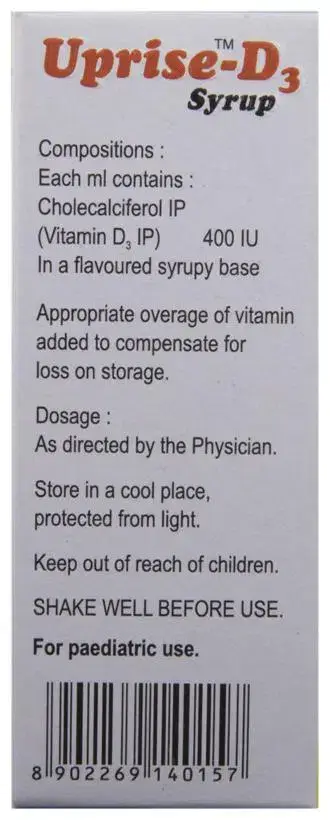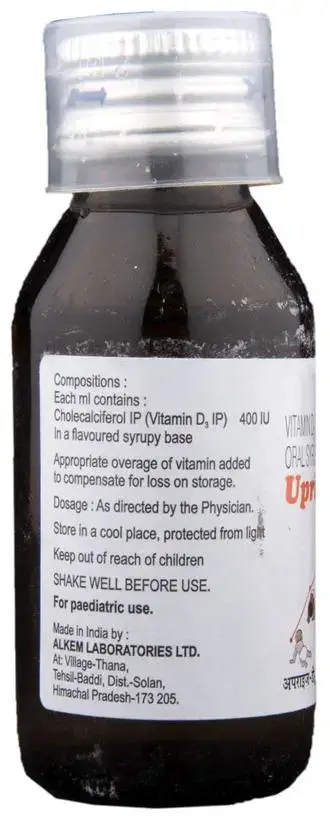Vitamin D3 (Cholecalciferol) Syrup
Generic
Cholecalciferol (Generic Equivalent to Vitamin D3)
Cholecalciferol (Generic Equivalent to Vitamin D3)
Vitamin D3 syrup is a combination of Calcium carbonate, Vitamin D3 (Cholecalciferol) and minerals like Zinc and Magnesium which is used as bone joint supplement.
Calcium carbonate is a mineral that is required for the formation of bones and maintaining them. Calcium carbonate is required to prevent breakage of bones. Calcium is used to prevent or treat low blood calcium levels in people who do not get enough calcium from their diets.
Vitamin D3 (Cholecalciferol) that is used in the absorption of calcium in the blood. Vitamin D3 helps in processing of essential minerals in the body like Calcium and Phosphorus. Lack of Vitamin D3 results in bone weakening, bone pain, and skin diseases.
Other minerals like Zinc and Magnesium are necessary for bone mineralization and bone matrix formation.
Vitamin D3 is a nutritional supplement which can be taken by people who have low levels of calcium in their blood. Vitamin D3 is used in elderly people to keep bones healthy and strong, and is even effective in Chronic arthritis and Osteoporosis.
Uses Of Vitamin D3 Syrup
- Vitamin D3 Syrup is used to treat low blood calcium levels.
Benefits Of Vitamin D3 Syrup
It effectively treats various conditions in the body like Vitamin D deficiency, osteoporosis, hypoparathyroidism, latent tetany and rickets or osteomalacia.
Side Effects Of Vitamin D3 Syrup
- Constipation
- Increased blood calcium levels
- Increased calcium levels in urine
- Vomiting
- Nausea
- Chest pain, feeling short of breath
- Early signs of vitamin D overdose are -weakness, metallic taste in your mouth, weight loss, muscle or bone pain, constipation, nausea and vomiting.
How To Use Vitamin D3 Syrup
You can take Vitamin D3- Syrup with or without food at regular intervals, as prescribed by the doctor. Your doctor will decide the dosage based on the severity of your medical condition. Measure the liquid form of Vitamin D3-Syrup with a measuring cup and take it as advised by the doctor.
Disclaimer :The information provided on the website is intended to facilitate awareness about healthcare products and medical conditions generally but it is not a substitute for professional medical attention or advice. You should always speak with a qualified healthcare practitioner before taking any prescription or non-prescription drug. |
| Product Type--Salt | Generic–Cholecalciferol (Generic Equivalent to Vitamin D3) |
|---|---|
| tag--Manufacturer | Best Selling–Alkem Laboratories, Top Brand–Indchemie Health Specialities |
| Power--Pack Size | 400IU–30ml in 1 Bottle (1 Bottle), 400IU–30ml in 1 Bottle (2 Bottles), 400IU–30ml in 1 Bottle (4 Bottles), 400IU–30ml in 1 Bottle (6 Bottles), 400IU–30ml in 1 Bottle (1 Bottle), 400IU–30ml in 1 Bottle (2 Bottles), 400IU–30ml in 1 Bottle (4 Bottles), 400IU–30ml in 1 Bottle (6 Bottles) |






